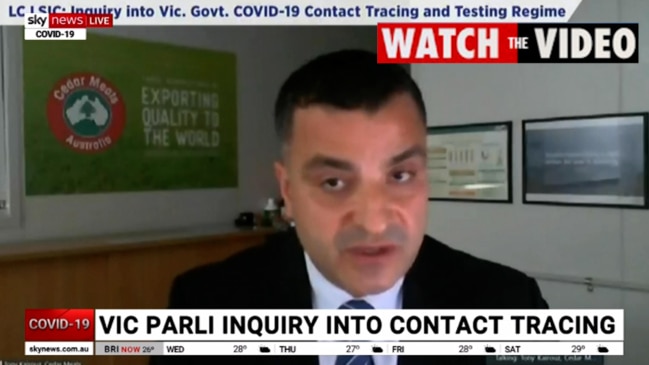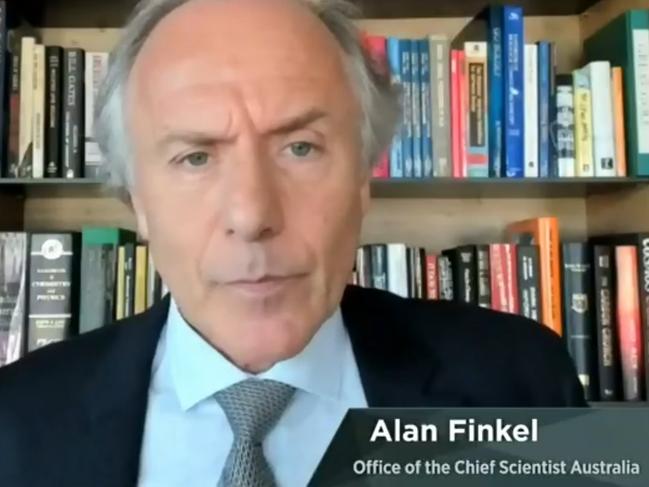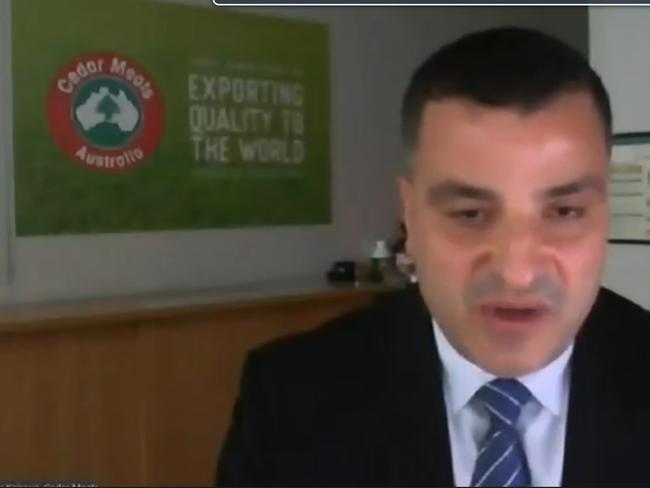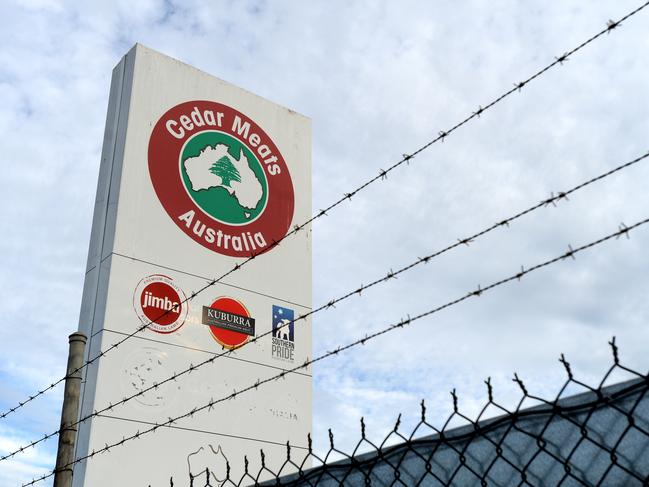Cedar Meats manager, chief scientist front Victoria COVID-19 contact tracing inquiry
Australia’s chief scientist says Victoria’s contact tracing system was “overwhelmed” during the deadly first and second waves, while a sick Cedar Meats worker was twice denied a COVID-19 test, an inquiry has heard.

Coronavirus
Don't miss out on the headlines from Coronavirus. Followed categories will be added to My News.
Australia’s chief scientist says Victoria’s contact tracing system has “significantly improved” from the first and second waves of coronavirus where positive cases were “not being managed end to end”, an inquiry has heard.
Dr Alan Finkel who conducted a review of the nation‘s contact tracing and believed all jurisdictions had improved their capability during Victoria’s second wave of coronavirus, said a switch to a digital contact tracing program was “more efficient and less error prone”.
“It all comes to preparation and there’s no question the Victorian system was overwhelmed,” he told an inquiry into the state’s contact tracing system on Wednesday morning.
“Cases just weren’t being managed end to end, some were lost, duplications occurred – it was difficult.
“If you have a system that‘s designed for a certain location or measles and other infectious diseases, then you’re hit by a pandemic with large numbers that are doubling every four or five days – Unless you are fully prepared for that, and supported by an appropriate technology base, fully prepared in terms of training, anticipation and preventative measures to slow the rate of increase in the first place, it’s easy to get overwhelmed and yes Victoria was overwhelmed.”

Dr Finkel said health authorities in Australian jurisdictions were now training to be able to manage 50 cases for a sustained period per day and per million people.
“Which in the case of Victoria would be training for 350 cases per day without losing the ability to manage those cases,” he said.
“That’s not easy to do but we do believe it’s achievable through having surge workforces in place already trained and already authorised to do the work, the technology in place to make each person’s contribution as efficient as possible, where if Victoria in the past had had better systems in place they might not have gotten to the point of breakdown.”
Going forward, Dr Finkel recommended the Victorian government neglect its old pen and paper contact tracing system and adopt a fully digital, modern program.
He suggested, even in situations of high case numbers, COVID-19 test results should be returned within 24 hours and no more than 48 hours should pass between the time the test sample was collected and the close contact of the confirmed case being told to quarantine.
DHHS ‘UNPREPARED’ FOR CEDAR MEATS OUTBREAK
DHHS was “unprepared” for the coronavirus outbreak at Cedar Meats - one of the country’s first and largest outbreaks in a meat works setting - with the abattoir’s patient zero refused a COVID test two times.
Cedar Meats general manager Tony Kairouz said as soon as two cases were linked to the Brooklyn abattoir on April 27 there were discussions to have about 350 staff tested on site, but DHHS failed to organise this.
“Instead staff were asked to attend a multitude of test sites, which made it all the more complex and inefficient in containing the outbreak,” he said at Wednesday’s hearing.
Mr Kairouz also told the inquiry all control of communication was handed over to DHHS on May 1, when the site was closed, despite a language barrier among many of the abattoirs employees.
“That‘s where we felt we would have been more useful to the DHHS, but as far as communication that DHHS had, essentially with our staff, we were not privy to that as soon as we were in an outbreak, all that communication was effectively taken over by DHHS,” he said.
“Apart from them sort of communicating back to us that they are having difficulty in contacting some of the staff that’s about all the information that we’ve got as far as the communication.”

Despite the DHHS linking a case to the abattoir on April 2, Mr Kairouz said he was aware of the first two employees testing positive on April 27.
He said a worker had gone to hospital after severing his thumb at work on April 23 - he developed a cough at Sunshine hospital and was tested for coronavirus where he received a positive result.
While another worker had not been feeling well and not been at work since April 17 - it took three visits to the doctor until he was finally tested for coronavirus and then tested positive.
Mr Kairouz said the employee was told he “didn’t have symptoms to warrant a COVID test”.
“What was evident to us was the fact that this was also something that DHHS was not prepared for,” Mr Kairouz said.
“We were the first outbreak in an industrial setting in Australia. And I believe that both Cedar Meats and DHHS did the best they could with the resources and knowledge they had at the time.”
CEDAR MEATS, CHIEF SCIENTIST FRONT INQUIRY
The management of an abattoir at the centre of one of Victoria’s largest coronavirus outbreaks, as well as Australia’s chief scientist, will give evidence at an inquiry into the state’s contact tracing system.
The parliamentary panel will hear from Cedar Meats general Manager Tony Kairouz on Wednesday, Australia chief scientist Dr Alan Finkel and health experts from the University of NSW.
The state‘s contact tracing effort during the deadly second wave of coronavirus attracted widespread criticism, forcing the Andrews government and its top health officials to defend the system.

The parliamentary inquiry was then established last month after upper house crossbenchers supported the opposition’s motion for the probe into the government’s contact tracing performance during the second wave.
On Monday, Australia Medical Association Victoria president Julian Rait slammed the Department of Health and Human Services as “culturally flawed” and called for GPs to play a greater role in contact tracing.
While Silicon Valley tech giant Salesforce – which had the capacity to bring Victoria’s contact tracing methods into the digital age – was forced to wait five months before being officially engaged by the government, it was also revealed.
The Parliament‘s legal and social issues committee, chaired by crossbench MP Fiona Patten, will consider the “capacity and fitness for purpose” of the state’s contact tracing system.
Wednesday’s hearing will also hear from medical experts at Colac, Peninsula and Western Health facilities.
The inquiry will provide an initial report to the Legislative Council by November 30, while a final report is due by December 14.
Originally published as Cedar Meats manager, chief scientist front Victoria COVID-19 contact tracing inquiry


